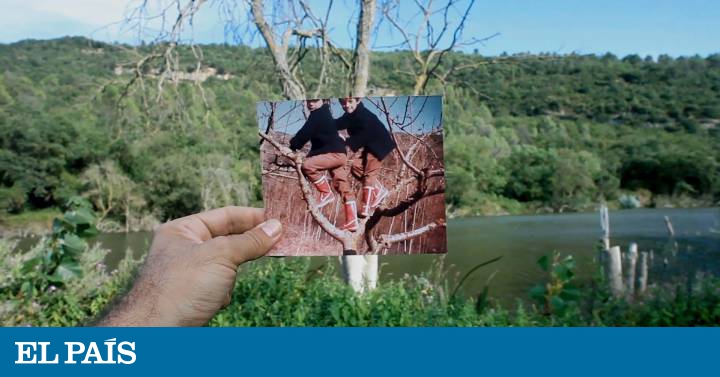Between the poem and the navigation diary, between the arcadia of the return to nature and the prosaic reality of a
survival
reality
, between oblivion and memory, the filmmaker Oskar Alegría (Pamplona, 1973) turns his latest film,
Zumiriki ,
in a miracle against time.
Like a castaway on an island of memories, Alegría summons trees, animals, the last shepherds and lost words from the forest of his childhood.
The title refers to one of them, noted by his father in a dictionary of Basque words condemned to extinction.
It means an island in the middle of a river and it is the beginning of this feat full of love, humor and knowledge of cinematographic language.
All with the sole purpose of conquering a small island of submerged memory.
MORE INFORMATION
The castaway who dreamed of returning to his island
The film, which was presented at the 2019 Venice Film Festival and is now premiering at the Madrid Cinematheque, where it will be screened until October 1, is the third feature film by the director of
La casa Emak Bakia
(2012), a celebrated film about the place on the French Basque coast where Man Ray filmed the surrealist short of the same title in 1926, which will be screened simultaneously until October 4.
This time, Alegria is the main character in her own film and the underlying theme has some artistic or
performance action
.
The filmmaker locked himself for several months in the forest inside a small wooden construction camouflaged between branches and painted inside in the color “Japanese ash”.
A black box that symbolizes the origins of photography and cinema, the magic of an artifact capable of raising the dead.
Inside, extreme minimalism reduces everything to an antique chair arranged with his own hands, a clock stopped forever at 11 o'clock, 36 minutes and 23 seconds, which he found in an old family house, and some river stones painted with a white stripe to mark the passing of the days.
Outside the cabin, all the exuberance of the Gorriza landscape, in Navarra.
And everywhere, the video cameras with which he recorded what was happening there day and night and which, like a pastoral Herzog, helped him to pursue his own entelechy: a runaway cow that one day escaped from the slaughterhouse to never return to any flock.
The director Oskar Alegría, in the wooden construction where he secluded himself to film 'Zumiriki'.
In addition to the findings of the material shot for weeks in the forest, the readings, the disturbing nocturnal presences, the movies in Super 8 of his father, the river and the reflections on its shore, we must add at least two prodigies .
One has to do with one of the first films in Basque.
A 1947 film that was missing for years, which finally recovered, but without sound, and that
Zumiriki
relives with the same shocking beauty that captures the last dream of the last shepherds of the Basque Pyrenees, octogenarian men whose mere presence makes this film in a priceless work.
Alegría accompanied them on their farewell night.
A last dream in the mountains that the restless filmmaker interrupted with his camera to ask a single question.
Elderly people with voices from another time that recall the embrace of a mother and her songs ("I loved her very much and she loved me," says a shepherd in the dark), who wonder why there are so many stars in the sky, who speak of the color of death or that describe the vision of the mountain covered by a white blanket of snow and silence, where only the fog remains, but no sign of the dog, the herd or themselves.
But it is not only what Oskar Alegría evokes, it is how he evokes it.
It is the knowledge of the cinema that allows him the daring and greatness of his experiment.
There are tricks, but never cheats, and that is why the film flows from beginning to end surprising in each new sequence or episode.
Quoting Tolstoy, the filmmaker affirms that whoever paints his village paints the world.
And what he paints, from the shore of the living, is that island-childhood that the dam flooded and condemned to oblivion.
Metaphor of the power of cinema and memory, of fantasy against death, and of all childhoods.
Zumiriki
(2020).
Oskar Joy.
It opens on Friday 25 at Cineteca (Madrid), where it can be seen until October 1.
The same room will screen
Emak Bakia
(1926), by Man Ray, until October 4.

